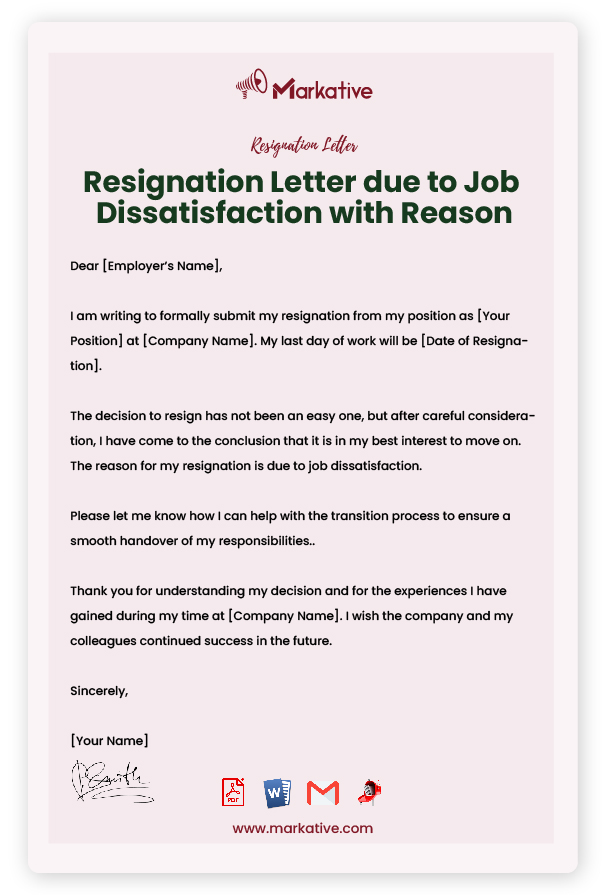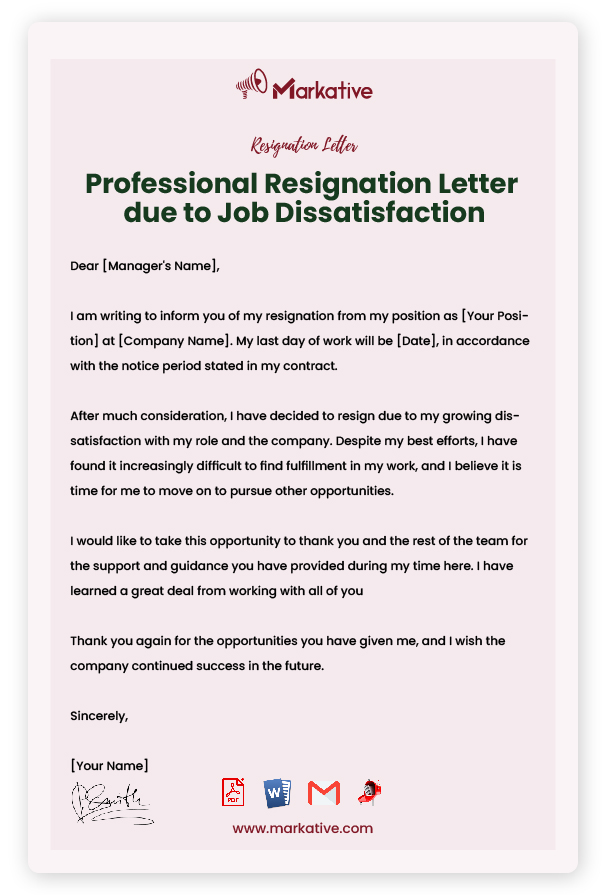Resigning from a job can be a daunting task, especially if it’s due to job dissatisfaction. However, writing a resignation letter is an important step to take if you’re feeling unhappy or unfulfilled in your current role. A resignation letter is a professional way to communicate your decision to leave your job, and it can also serve as a way to provide feedback to your employer about your reasons for leaving.
A well-crafted resignation letter can have a significant impact on your professional reputation and can help you maintain positive relationships with your former colleagues and employer. It can also be an opportunity to express gratitude for the experiences and opportunities gained while working with the company. It’s important to remember that a resignation letter is a formal document, and therefore it should be professional and respectful in tone.
In this article, we will discuss the importance of writing a resignation letter due to job dissatisfaction. We will also provide tips on how to craft a good resignation letter that will make a positive impact on your career. Lastly, we will explore some common mistakes to avoid when writing a resignation letter. Whether you’re leaving due to job dissatisfaction or simply seeking new opportunities, this article will provide you with the necessary guidance to write a resignation letter that will leave a lasting impression.
How To Write Appealing Resignation Letter due to Job Dissatisfaction?
Writing a resignation letter due to job dissatisfaction can be a challenging task, but it’s crucial to maintain a professional tone and leave on good terms with your employer. Here are five steps on how to write an appealing resignation letter with examples.
- Start with a clear statement: Begin your resignation letter with a clear statement that you are resigning from your position due to job dissatisfaction. Keep it brief and to the point, and avoid going into too much detail about your reasons for leaving.
Example: “Please accept this letter as my formal resignation from my position as [Job Title] at [Company Name]. Unfortunately, due to ongoing job dissatisfaction, I have decided that it’s in my best interest to resign from my role.”
- Express gratitude: Express your gratitude towards your employer and colleagues for the opportunities and experiences gained while working in the company. This shows that you value the professional relationship you have developed with them.
Example: “I want to take this opportunity to express my sincere gratitude for the opportunities and experiences that I have gained while working at [Company Name]. I am grateful for the professional relationships I have developed with my colleagues and the skills that I have acquired while working in this role.”
- Provide notice period: Give your employer an ample amount of notice period, as per your contract or company policy. This will give them enough time to find a replacement or make arrangements for your departure.
Example: “As per my contract, I am willing to provide a notice period of [Notice Period Length], and I am more than happy to assist in the handover of my responsibilities to ensure a smooth transition.”
- Keep it professional: Maintain a professional tone throughout the letter and avoid blaming anyone for your job dissatisfaction. Remember that this letter will become a part of your employment record.
Example: “While I regret having to resign, I believe it’s the best decision for me at this time. I hope that my resignation does not cause any inconvenience to the company, and I will ensure that I fulfill all my responsibilities during my remaining time in the role.”
- Close on a positive note: Close the letter on a positive note, reiterating your appreciation for the time you have spent at the company, and wishing your employer and colleagues the best for the future.
Example: “I wish the company continued success in the future, and I look forward to seeing its growth and achievements in the coming years. Thank you once again for the opportunities and experiences, and I wish you all the best.”
Conclusion: Writing an appealing resignation letter due to job dissatisfaction requires careful consideration and a professional approach. By following these steps and examples, you can ensure that you leave on good terms with your employer and maintain a positive professional relationship.

Professional Resignation Letter due to Job Dissatisfaction
Dear [Manager's Name], I am writing to inform you of my resignation from my position as [Your Position] at [Company Name]. My last day of work will be [Date], in accordance with the notice period stated in my contract. After much consideration, I have decided to resign due to my growing dissatisfaction with my role and the company. Despite my best efforts, I have found it increasingly difficult to find fulfillment in my work, and I believe it is time for me to move on to pursue other opportunities. I would like to take this opportunity to thank you and the rest of the team for the support and guidance you have provided during my time here. I have learned a great deal from working with all of you, and I am grateful for the opportunities and experiences that I have gained. Please let me know if there is anything I can do to make the transition process easier, such as training my replacement or completing any outstanding projects before my departure. I am committed to ensuring a smooth transition and ensuring that my departure does not disrupt the team's operations. Thank you again for the opportunities you have given me, and I wish the company continued success in the future. Sincerely, [Your Name]
Resignation Letter due to Job Dissatisfaction with Reason
[Your Name] [Your Address] [City, State ZIP Code] [Your Email] [Date] [Employer's Name] [Company Name] [Address] [City, State ZIP Code] Dear [Employer’s Name], I am writing to formally submit my resignation from my position as [Your Position] at [Company Name]. My last day of work will be [Date of Resignation]. The decision to resign has not been an easy one, but after careful consideration, I have come to the conclusion that it is in my best interest to move on. The reason for my resignation is due to job dissatisfaction. Despite my efforts to improve the situation, the working conditions and environment have not met my expectations. I have been experiencing [specific examples of job dissatisfaction] which have been ongoing for a significant period of time, and it has negatively impacted my work performance and motivation. I believe that it is best for both parties if I step down from my position, and allow someone else to take over the role. I want to take this opportunity to express my appreciation for the opportunities given to me during my time at [Company Name], and for the support provided by my colleagues. Please let me know how I can help with the transition process to ensure a smooth handover of my responsibilities. I will do my best to complete all outstanding tasks and leave detailed instructions for my replacement. Thank you for understanding my decision and for the experiences I have gained during my time at [Company Name]. I wish the company and my colleagues continued success in the future. Sincerely, [Your Name]
Resignation Letter due to Job Dissatisfaction without Reason
Dear [Employer], I am writing to inform you of my resignation from my current position at [Company]. My last day of work will be [date]. While I have enjoyed working with the company and appreciate the opportunities that have been presented to me, I have come to the decision that it is time for me to move on. I would prefer not to disclose the reasons for my departure, as I believe it is in my best interest to keep them to myself. I want to thank you and the entire team for the support and guidance you have given me during my time at the company. I have learned a lot and am grateful for the experiences I have had here. I will do everything possible to ensure a smooth transition and will work with you to ensure that all of my responsibilities are handed over to a suitable replacement. I wish you and the company all the best in the future. Sincerely, [Your Name]
Urgent Resignation Letter due to Job Dissatisfaction Sample
Dear [Manager's Name], I am writing to inform you of my immediate resignation from my position at [Company Name]. It is with great regret that I have come to this decision, but unfortunately, my job satisfaction has reached an all-time low. Over the past few months, I have become increasingly dissatisfied with my role and the working conditions at [Company Name]. Despite my efforts to raise these concerns with my superiors, no significant action has been taken to address the issues. As a result, I have decided that it is in my best interest to resign from my position. I want to take this opportunity to thank you for the opportunity to work for [Company Name]. I have gained valuable experience and developed my skills during my time here. However, I feel that my current position is no longer fulfilling my career aspirations, and it is time for me to move on. I will ensure that I complete all of my outstanding tasks before my departure, and I am happy to assist with the transition to a new team member. My final day of work will be [Date], as per the terms of my contract. Once again, I want to express my appreciation for the opportunities that [Company Name] has provided me during my tenure. I wish the company every success in the future. Sincerely, [Your Name]
Simple Resignation Letter due to Job Dissatisfaction
[Your Name] [Your Address] [City, State ZIP Code] [Your Email] [Date] [Employer's Name] [Employer's Address] [City, State ZIP Code] Dear [Employer's Name], I am writing to inform you that I am resigning from my position as [Your Job Title] at [Company Name], effective [Date]. This decision has not been an easy one, but after careful consideration, I have come to the conclusion that it is time for me to move on. I have been experiencing a significant amount of job dissatisfaction in my current role, and after several attempts to address these concerns, I feel that it is in my best interest to seek other employment opportunities. While I appreciate the time and effort that you and the company have invested in me, I believe that this decision is necessary for my personal and professional growth. I would like to take this opportunity to express my sincere gratitude for the experiences and skills that I have gained during my time with the company. It has been an honor to work alongside such a talented and dedicated team. I will do everything I can to ensure a smooth transition during my remaining time here. Please let me know if there is anything further I can do to assist in the transition process. Thank you again for the opportunities and support that you have provided me during my time at [Company Name]. Sincerely, [Your Name]
How Much Notice Should You Give for a Resignation Letter due to Job Dissatisfaction?
According to a report by the US Bureau of Labor Statistics, in January 2022, the unemployment rate was 4.2 percent, with approximately 6.2 million people unemployed. The industries with the highest job growth included professional and business services, education and health services, and leisure and hospitality. Additionally, the median length of time that people were employed in their current jobs was 4.2 years.
When resigning from a job due to dissatisfaction, it’s important to consider the company’s policies and any legal obligations. In general, it’s recommended to provide at least two weeks’ notice when resigning. However, this may vary depending on the specific circumstances of the job and the company’s policies. Some companies may require more notice, while others may be more flexible. It’s important to check the employee handbook or consult with HR to determine the appropriate amount of notice to give. Additionally, it’s recommended to be professional and courteous in the resignation letter, focusing on the reasons for leaving and expressing gratitude for the opportunities provided by the company.
Is it Ok To Email a Resignation Letter due to Job Dissatisfaction?
It is generally acceptable to email a resignation letter due to job dissatisfaction, as long as the email is professional and courteous in tone. However, it is recommended that you also follow up with a formal hard copy resignation letter delivered in person or by mail. This ensures that there is a paper trail and that your resignation is properly documented. For example, you might write something like this in your email:
Dear [Manager's Name], I regret to inform you that I have decided to resign from my position as [Job Title] effective [Date]. While I have enjoyed working with the company, recent changes in my responsibilities have left me feeling dissatisfied with my role. I appreciate the opportunities I have had here and wish the company continued success. Sincerely, [Your Name]

Common Mistakes When Writing a Resignation Letter due to Job Dissatisfaction?
- Being Too Emotional: It’s important to remain professional and objective when writing a resignation letter due to job dissatisfaction. Avoid using emotional language or making personal attacks on your employer or colleagues.
- Providing Too Much Detail: While it’s important to provide a reason for your resignation, don’t go into too much detail about your dissatisfaction with the job. Keep the letter brief and to the point, and focus on the main reason for your decision to resign.
- Burning Bridges: It’s important to maintain a positive relationship with your employer and colleagues, even if you’re leaving due to job dissatisfaction. Avoid burning bridges by expressing gratitude for the opportunity to work with the company and offering to help with the transition process.
Conclusion:
writing a resignation letter due to job dissatisfaction can be a challenging task. However, following some basic guidelines can help ensure that the process goes smoothly. It is essential to send your resignation letter to your supervisor or manager, as well as to the human resources department. It is also important to give sufficient notice, usually at least two weeks, to ensure that your departure is as smooth as possible.
When writing your resignation letter, it is crucial to avoid common mistakes such as being overly negative or emotional. Keep your tone professional and positive, and focus on the reasons for your departure. Be sure to thank your employer for the opportunities and experiences you gained while working there.
Finally, using a ready-to-use template can make the process of writing a resignation letter much easier. There are multiple templates available online that you can customize to your needs. With these templates, you can ensure that your letter is well-structured and meets all the necessary requirements.
In summary, writing a resignation letter due to job dissatisfaction requires tact and professionalism. Sending your resignation letter to the right people, giving sufficient notice, avoiding common mistakes, and using templates can all help ensure that the process goes as smoothly as possible.







